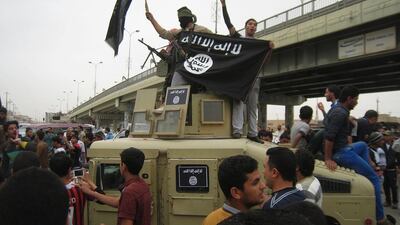If they were more cuddly ISIL might be called “the history boys” of the radical extremist world, though they are nothing like the English schoolboys dolefully condemned to cramming dates, kings and battles in Alan Bennett’s fabulous play.
As Sudan’s president Omar Al Bashir recently told this paper, there is a lot of charged talk in his region about ISIL establishing “Habasha”, an emirate that would be made up of present-day Sudan, Ethiopia, Somalia and Eritrea. Habasha, of course, is a name with enormous historical significance for Muslims because of the journey to the country by the Prophe’s followers in Islam’s early days. Then there is the thuggish Sharia Youth Council in Derna, which has sworn fealty to ISIL. They have named their so-called caliphate “Barqa”, as eastern Libya was known after the 7th century Arab conquest. Last year, a map shared online by ISIL, of the areas it plans to control by 2020, boastfully recast cartography in blocs that hark back to specific periods in 1,400 years of Muslim rule of the world – Andalus, Khorasan, Qoqaz, Anathol, Orobpa.
It is mildly diverting to note that ISIL seem to have set something of a fashion for unexpected historical inquiry among extremist groups. Some of these, not least the Al Qaeda-affiliated Khorasan group in Syria, seem determined to extract the most aspirational fragments of Islam’s glorious past in the area they seek to control. It is a cynical and callous move that starts with the first symbolic utterance – the name, say, Khorasan. But the more serious point is ISIL’s steady grasp of the longue duree, the long term. The longue duree’s importance has been constantly stressed by the great French historian Fernand Braudel as the only way to make history usable for political purposes.
In his massive account of the Mediterranean, published in the 1940s, Braudel was exceptionally careful not to confuse events with history. Events, he believed, were brief, rapid, nervous oscillations, the “froth” on the waves of time. But history, he said, took place at much greater depths and iceberg-like, was often hidden from view. It has unseen consequences and makes connections at the level of ideas.
That ISIL world map then, was an audacious attempt at the grand narrative statement, a show-off embrace of a longer timescale, not of decades or centuries, but of millennia. Habasha, Barqa and ISIL’s own so-called caliphate in Syria and Iraq, with its self-proclaimed murderous ruler styled as “Caliph Ibrahim”, are meant to give the impression of something solid and probable, mostly because they appear to be grounded in the documented past. All of this is insidiously calculated to have the enduring feel of Edward Gibbon’s description of the Arabian empire under the last of the Umayyad caliphs: “(It) extended 200 days journey from east to west, from the confines of Tartary and India to the shores of the Atlantic Ocean. The language and laws of the Quran were studied with equal devotion at Samarcand (sic) and Seville; the Moor and the Indian embraced as countrymen and brothers in the pilgrimage of Mecca; and the Arabian language was adopted as the popular idiom in all the provinces to the westward of the Tigris.”
ISIL’s canny use of history may be best explained by Braudel’s theory that this is the only discipline capable of explaining how short-term events fit into the long-term pattern, the long arc of destiny. Though they may never have read him, Braudel’s argument has been repeatedly pressed into use by many leaders, regimes and movements over time to establish legitimacy.
The best examples in the past 300 years have to be Napoleon, the British royal family and the deposed Shah of Iran, Mohammad Reza Pahlavi. Each used a purpose-built version of the past, to tap into tradition for ballast, to achieve a specific objective.
For Napoleon, it meant claiming some sense of historical legitimacy from Charlemagne, king of the Franks, who united most of western Europe during the Middle Ages. Soon after he became emperor, Napoleon thought it time to visit his “predecessor”, Charlemagne, and by some accounts, stood “visibly moved” before his ancient tomb, which had been empty since 1165. During his imperial reign, Napoleon would constantly invoke Charlemagne’s name in matters as disparate as his divorce from Josephine, crowning his successors and his legitimacy as ruler of France.
The concept of inventing traditions is well documented. In the 1980s, British historian Eric Hobsbawm was writing about British royalty’s habit of employing the apparently ancient pageantry to mark significant events, all of which “were the product of the late 19th and 20th centuries”. These traditions of royal ritual were assiduously invented for coronations, jubilees and weddings, portraying in a fake-medieval fashion, almost like Pre-Raphaelite paintings, a seemingly continuous ancient way of doing things. But when Queen Victoria was feted in 1897, on her Golden Jubilee for 60 years on the British throne, it was really the first such, lavish, market-led Festival of the British Empire and it had been proposed by the colonial secretary Joseph Chamberlain.
Those are successful examples of historical reinvention. But it can go spectacularly wrong too, as with the Shah of Iran’s lavish three-day attempt in 1971 to plug his reign into Persia’s golden past and that of Cyrus the Great. He spent too much money, perilously neglected the Islamic foundations of modern Iran and was deposed within a few years.
All of which goes to show that the past can be a viable template only if the present mirrors it closely enough. So, what place does ISIL’s brutality have in Islam’s history of peace and tolerance? None. It is doomed to fail. Eventually.
rroshanlall@thenational.ae
On Twitter: @rashmeerl


